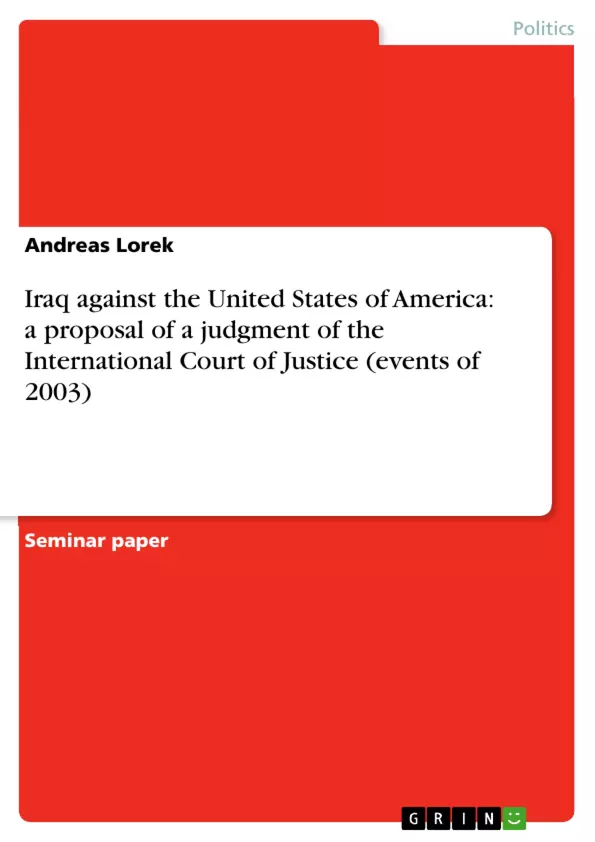“The International Court of Justice established by the Charter of the United Nations [is] the principal judicial organ of the Unirted Nations”is laid down in article 1 of the Statute of the International Court of Justice (ICJ). The ICJ consists of 15 international judges of high moral character who are elected by the General Assembly (GA) and the Security Council of the United Nations (UNSC). It is not permitted to have two judges of the same nationality in the Court. Judges are elected for nine years, re-election for another period is possible. Every three years elections will be held in which five judges are chosen. If the bench of judges does not include one with the nationality of a state of the dispute, this state can appoint a person to sit ad hoc for this case.
The seat of the ICJ is at the Peace Palace in The Hague, Netherlands, nevertheless it is possible to exercise its functions elsewhere. The ICJ has two main functions: it has to settle legal disputes submitted to the Court in accordance with international law and secondly it has to give advisory opinions on legal questions (ICJ 2005a).
Only states can be parties in front of the ICJ. It is open to all states that have ratified the Statute, conditions for other states can be made by the UNSC. Article 36 of the Statute of the ICJ makes clear that“the jurisdiction of the Court comprises all cases which the parties refer to it and all matters specially provided for in the Charter of the United Nations”.All Members of the UN are as well parties to the ICJ, as laid down in Article 93 of the Charter of the United Nations (UN). A dispute could be brought to the attention of the ICJ by any member of the UN (Charter of the UN: Article 35.1) or a party to the dispute (Charter of the UN: Article 35.2). The UNSC is like the ICJ a principal body of the UN. These two bodies often have to act in correlation, a complete separation of powers does not exist. Their functions are complementary (cp. Skubiszewski 1996).
States have the opportunity to accept the jurisdiction of the ICJ generally in respect of all occurring disputes or only particular ones. A general acceptance of the ICJ needs a declaration from a state which is party to the present Statute (Statute of the ICJ: Article 36.2).
Inhaltsverzeichnis (Table of Contents)
- 1. Background
- 1.1. International Court of Justice
- 1.2. Background of the present case
- 1.3. The case of Iraq
- 2. Arguments of both parties
- 2.1. The accusation: Iraq
- 2.2. The defense: United States of America
- 2.3. Iraq's response
- 2.4. America's final defense
- 3. The (proposal of a) judgment of the ICJ
Zielsetzung und Themenschwerpunkte (Objectives and Key Themes)
The paper presents a proposal for a judgment of the International Court of Justice (ICJ) concerning the 2003 US invasion of Iraq. The author examines the legal arguments put forth by both parties and provides a comprehensive analysis of the relevant international law principles. The paper explores the potential legal ramifications of the invasion and seeks to provide a framework for a just and equitable resolution of the dispute.
- The role and jurisdiction of the International Court of Justice
- The legal basis for the US invasion of Iraq
- The violation of international law by the US
- The impact of the invasion on Iraqi sovereignty
- The responsibility of the US for war crimes
Zusammenfassung der Kapitel (Chapter Summaries)
The paper begins by providing an overview of the International Court of Justice, including its composition, jurisdiction, and functions. It then dives into the background of the case, discussing Iraq's history and the events leading up to the 2003 invasion. The paper focuses on the legal arguments presented by both parties, including Iraq's accusations of illegal aggression and the US's defense.
Schlüsselwörter (Keywords)
International Court of Justice, ICJ, International Law, US invasion of Iraq, 2003, Aggression, War Crimes, Sovereignty, United States of America, Iraq, UN Security Council, Resolution 678, Weapons of Mass Destruction.
Frequently Asked Questions
What is the function of the International Court of Justice (ICJ)?
The ICJ settles legal disputes between states and provides advisory opinions on legal questions submitted by authorized UN organs and agencies.
How are judges elected to the ICJ?
The court consists of 15 judges elected for nine-year terms by the UN General Assembly and the Security Council. No two judges may be of the same nationality.
Was the 2003 US invasion of Iraq legal under international law?
The paper analyzes arguments regarding the violation of Iraqi sovereignty and the legality of the invasion, proposing a judgment based on international law principles.
Can individuals be parties in front of the ICJ?
No, only states can be parties in cases before the International Court of Justice.
What is the relationship between the ICJ and the UN Security Council?
They are both principal organs of the UN with complementary functions. While the ICJ deals with legal settlements, the Security Council can make conditions for states to access the court.
- Quote paper
- Andreas Lorek (Author), 2005, Iraq against the United States of America: a proposal of a judgment of the International Court of Justice (events of 2003), Munich, GRIN Verlag, https://www.grin.com/document/65896



